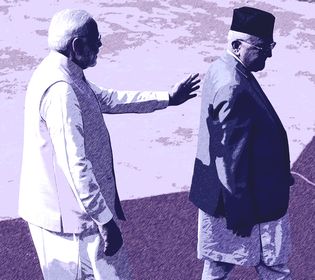Nepal’s Prime Minister Khadga Prasad Oli, who paid a three-day state visit to India last week, and Indian Prime Minister Narendra Modi are strikingly similar political personalities. Both are charismatic politicians, completely self-made, forceful and clever, and highly nationalistic in outlook.
Both leaders have deep-rooted ideological convictions. If the “known unknown” about Modi is the time he had apparently spent in the Himalayas as a wandering Hindu to fine-tune his ideological moorings, the “known known” about Oli is that he spent the best years of his youth in a Nepali prison for 14 consecutive years for being a communist revolutionary and came out of it, at the age of 35, still a hardcore Marxist-Leninist.
A personal chemistry between the two leaders may be too much to expect, as like poles do not attract each other. But that is irrelevant here, given the factors at work in the India-Nepal relationship today. Oli’s Nepal becomes a strange new experience because this is the first time that India has to deal with a government in its immediate neighbourhood, which draws ideological sustenance from dialectical materialist principles and laws of development.
For the Modi government, this will pose a formidable challenge, since Nepal is surrounded by BJP-run governments in the Hindu/Hindi heartland, and as time passes, comparisons are bound to be drawn. Oli’s style of inclusive governance is already attracting the Madhesis (who used to look towards Delhi for guidance). In our country, on the contrary, the ruling elite has been advocating a “Congress-mukt India”.
The cardinal issue, therefore, is that a reset is needed in the Modi government’s approach toward Nepal. Sadly, Oli harbours disquiet over continuing Indian interference in Nepal’s internal affairs. The overall impression one gets out of Oli’s state visit is that his Indian hosts seem to regard him as a transitory phenomenon. This can prove to be serious misjudgment. Oli is a strong-willed leader with decades of experience in statecraft. It was too much to expect the Modi government to seek out Sharad Yadav or Sitaram Yechury to help the country build new bridges to Oli. Nor is it anyone’s case that Modi should have received Oli at the airport or that he and UP Chief Minister Yogi Adityanath should have taken the visiting Nepali leader for a boat ride from Assi Ghat to Dashashwamedh Ghat in Varanasi. However, it must be underscored that there is something inherently flawed in our government’s foreign policy priorities. Nepal ought to rank way above France in our calculus.
Oli has been very candid and firm that Nepal expects an equal relationship based on mutual respect and mutual benefit. Is that too much to expect? He asserts Nepal’s sovereignty and independence, and its aversion to getting sucked into the India-China “competitive tournaments”. Isn’t it understandable? Oli prioritises Nepal’s development and is determined to take help from both neighbours. Isn’t that a perfectly reasonable stance, too? The bottom line is that our track record as Nepal’s neighbour and partner country has been abysmally poor.
We have behaved as if we are stakeholders in keeping Nepal unstable and beholden to us. Oli said with anguish to an Indian newspaper: “Twenty-two years have passed for one project (the Pancheshwar Multi-Purpose Project), and so we have to ask, what are we doing? Time won’t wait for us, and there is a Sanskrit saying that if you have to give something, or do something, and if you don’t do it on time, then time itself will destroy its value. When we signed the Pancheshwar agreement, I was a much younger man. In 22 years, I have aged, but the project has not been completed.”
Can there be a more devastating indictment of India’s Nepal policies?
The writer is a former diplomat.


